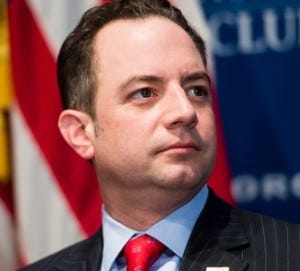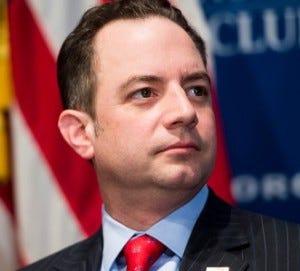
This morning, CNN announced the results of a new national poll that should mortify the faction of Republicans who firmly object to what presidential candidate Donald Trump has been doing to their party and the conservative movement. According to the poll, Trump now has the backing of 49% of GOP voters — a near majority.
The poll may well prove to be an outlier. Most others still place Trump at around 35% (roughly one-third support), where he's been hovering for quite some time. Then again, this CNN one reflects the latest sampling of the race, covering a date range between February 24th and the 27th, which no other polling agency has reported thus far.
Could the number be right, or at least suggest a significant uptick of Trump support? Yes, it absolutely could.
One can't underestimate the momentum that a string of state-primary and caucus victories (and a media narrative of inevitability) can bring to a presidential candidate. Because of that, Trump may soon have the support of a majority of Republicans. If that happens, he will not only become the party's nominee (even in a two-man race), but also its unequivocal leader.
If that's the fate of the GOP, expect a mass exodus from the party.
Last week, Jon Gabriel of Ricochet.com wrote a thought-provoking piece where he called on the RNC to cut Trump loose from the party. His reasoning came down to the supportive role the party establishment would eventually have to play, should Trump become the nominee:
"Once a candidate is the presidential nominee, it is the party’s job to defend every statement he makes. When Romney criticized the 47 percent, or McCain suspended his campaign after the economic crisis, or George W. Bush was blindsided by reports of a 1976 drunk driving arrest, the RNC had to support their candidates and aggressively attempt to spin the bad news in their favor.
Every candidate makes missteps here and there, but Trump has based his campaign on indefensible statements."
It's a really good point — one that I doubt most people have thought about. If Trump's the nominee, the GOP brass will not only be tasked with rationalizing his reprehensible personal conduct (a job currently filled by anonymous Internet trolls and certain cable news hosts), but also his stated policy positions.
These positions not only include lots of liberal, authoritative, government-heavy ideas for the economy and healthcare, but also new limitations on freedom of speech, forms of religious expulsion, the torturing of terrorists as a punitive measure (and the killing of their families), etc.
In propping up Trump, the RNC would even have to back a man who has portrayed our last Republican president as a war criminal who's to blame for 9/11, and who lied to take us to war with Iraq.
Sure, I expect Trump to soften his stances (dramatically in some cases) if he wins the nomination, but that would by no means erase what he has already said over and over again in front of television cameras. In many ways, Trump has presented himself as the embodiment of all the unfair stereotypes that Democrats have long applied to Republicans (greedy, sexist, bigoted), despite the fact that he rejects most of the principles Republicans have long stood for. The RNC would have to not only contend with that, but also Trump's legendary thin skin, which has resulted in the billionaire reflexively mocking American POWs, mocking disabled people, and publicly musing over a journalist's menstrual cycle.
Should this be the role of the RNC (even if the GOP is partially to blame for the rise of Trump)? Gabriel says no. He thinks they should disavow Trump from the party. He makes a good case, but if the GOP establishment hasn't done it by now, I can't imagine they ever will. So if Trump becomes the nominee, what does that mean for Republicans who are absolutely disgusted by Trump?
I'll tell you what it means: an abandonment of the party in large numbers. If Trump's the face of the GOP, the GOP will be no more. It will crumble into unprincipled disarray, as will the conservative movement — at least for several years.
Analysts are underestimating just how many long-reliable Republican voters (and donors, small and large) can't, in good faith, vote for Trump in a general election. When I wrote a column a couple of weeks ago explaining why I'm one of them, I was stunned by how many people my words resonated with. The piece went viral, caught the attention of national figures, and even landed me (a relatively unknown commentator) a television interview on TheBlaze network with Dana Loesch.
This #NeverTrump movement (as it's being called) is very real, and it's hardening with each new Trump debacle (like the David Duke/KKK incident over the weekend). At this point, the movement is an anti-Trump protest, but if the GOP establishment adopts the same kind of hypocritical, incoherent shilling that we saw from Chris Christie on Sunday (his interview with George Stephanopoulos was breathtakingly painful), it will morph into a significant departure of voters from the Republican Party.
Conversely, because the "Trump Train" has made it this far, largely un-vetted, unhindered, and steadily picking up media-driven passengers along the way, the GOP would most certainly lose a lot of Trump's supporters if they were to suddenly derail his nomination.
It's a total mess, no matter how you look at it. One thing's for sure: I wouldn't want to be Reince Priebus right now.











